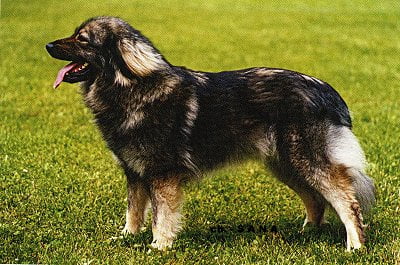Are you considering bringing a Karst Shepherd breed dog into your home? If so, it is important to understand the characteristics and needs of this breed before making a commitment. Karst Shepherds are a rare breed that originated in Slovenia, and are known for their intelligence, loyalty, and protective nature. They were bred to work as livestock guardians and have a strong instinct to protect their family and territory. While they can make excellent pets, they require a dedicated and experienced owner who can provide them with proper training, socialization, and plenty of exercise. In this article, we will explore the unique qualities of the Karst Shepherd breed and help you determine if they are the right fit for your family.
Breed Category: Herding
Country of Origin: Slovenia
Average Size:55-63 cm
Average Weight:25-40 kg
Average Life Span: 10-12 years
Grooming Requirements: Moderate
Exercise Requirements:High
History and Origin
The Karst Shepherd, also known as the Karst Sheepdog, is a breed of dog that originated in the Karst region of Slovenia. This breed is known for its intelligence, loyalty, and protective nature, making it an excellent working dog. The Karst Shepherd has a long history, dating back to the 16th century, and has played an important role in the lives of the people of the Karst region.
The Karst region is a limestone plateau that covers parts of Slovenia, Italy, and Croatia. The region is known for its rugged terrain, caves, and underground rivers. The Karst Shepherd was developed to work in this challenging environment, where it was used to guard flocks of sheep and protect them from predators such as wolves and bears. The breed was also used to guard homes and farms, and to help with hunting.
The exact origins of the Karst Shepherd are not known, but it is believed to be a descendant of the Molossus, a large, powerful dog that was used by the ancient Greeks and Romans for hunting and fighting. The Karst Shepherd was developed over time through selective breeding, with the goal of creating a dog that was strong, agile, and intelligent. The breed was recognized by the Fédération Cynologique Internationale (FCI) in 1968.
During World War II, the Karst Shepherd played an important role in the resistance movement in Slovenia. The breed was used to carry messages and supplies, and to help with reconnaissance. Many Karst Shepherds lost their lives during the war, but their bravery and loyalty were remembered by the people of Slovenia. Today, the breed is still used as a working dog, but it is also popular as a companion animal.
The Karst Shepherd is a large dog, with males weighing between 35 and 45 kg, and females weighing between 30 and 40 kg. The breed has a short, dense coat that is usually black or gray, with white markings on the chest and feet. The Karst Shepherd is known for its intelligence and trainability, and it is often used as a police or military dog. The breed is also popular in dog sports such as obedience, agility, and tracking.
In conclusion, the Karst Shepherd is a breed of dog that has a long and rich history. Developed in the rugged terrain of
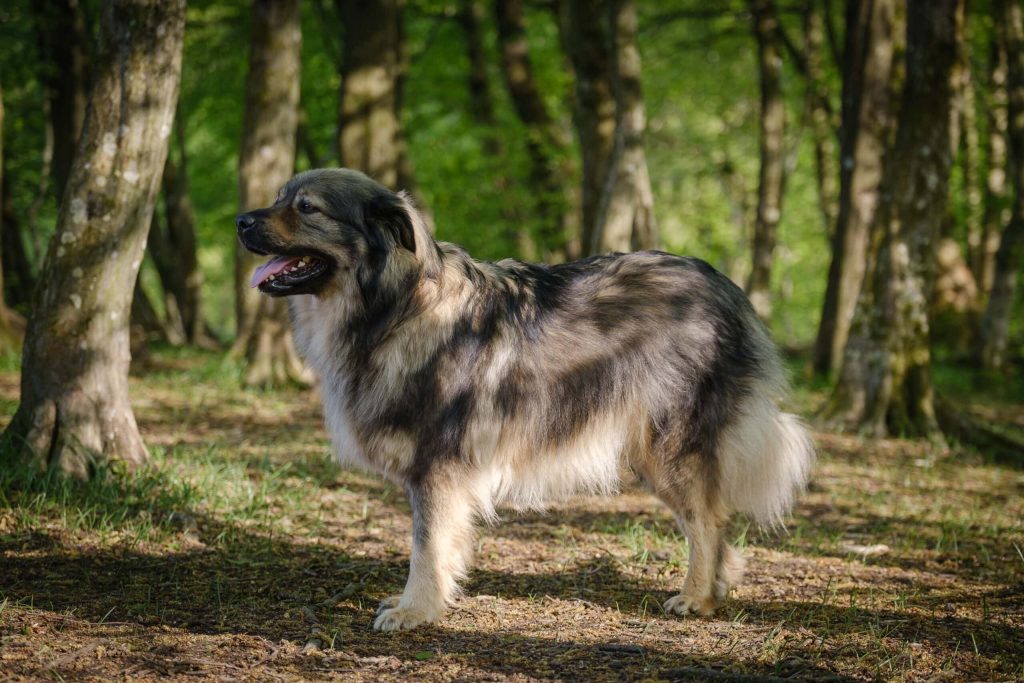
Size and Breed Category
The Karst Shepherd is a large breed of dog that originated in Slovenia. They are classified as a working breed and are known for their intelligence, loyalty, and protective nature. Karst Shepherds have a muscular build and a thick coat that is typically black or gray in color. They have a broad head with a strong jaw and dark, almond-shaped eyes. Their ears are triangular and stand erect, giving them a regal appearance. Karst Shepherds are typically between 60-70 cm in height and weigh between 30-40 kg. They are a powerful breed that requires regular exercise and training to keep them physically and mentally stimulated.
Karst Shepherds are a versatile breed that can be trained for a variety of tasks. They are often used as police or military dogs due to their intelligence and protective nature. They are also excellent guard dogs and make loyal companions for families. Karst Shepherds are known for their courage and will not hesitate to protect their owners from perceived threats. They are a breed that requires a firm and consistent hand in training, but with the right guidance, they can be a loving and devoted pet. Karst Shepherds are a breed that is well-suited for experienced dog owners who are willing to put in the time and effort to properly train and socialize them.
Fur Length and Colour
The fur of the Karst Shepherd is typically medium to long in length, with a dense undercoat and a coarser outer coat. The fur is designed to protect the dog from the harsh weather conditions of the mountainous regions where they originate. The fur is also water-resistant, which allows the dog to swim in cold water without getting wet. The fur can come in a variety of colours, including black, grey, and white. Some dogs may have a combination of these colours, with black being the most common. The fur is usually straight, but some dogs may have a slight wave to their coat. Overall, the fur of the Karst Shepherd is an important feature that helps them survive in their natural environment.
The colour of the Karst Shepherd’s fur can vary depending on the individual dog. Some dogs may have a solid colour, while others may have a combination of colours. The most common colour is black, which can range from a shiny jet black to a duller black with brown undertones. Grey is also a common colour, with shades ranging from light silver to dark charcoal. White is the least common colour, but some dogs may have white markings on their chest or paws. The colour of the fur can also change as the dog ages, with some dogs developing more white or grey hairs as they get older. Overall, the colour of the Karst Shepherd’s fur is a unique feature that adds to their individuality.
Termperament and Trainability
Karst Shepherds are known for their high energy levels and strong work ethic. They are a breed that thrives on physical activity and mental stimulation, making them an excellent choice for active families or those who enjoy outdoor activities. Their intelligence and eagerness to please make them highly trainable, and they excel in obedience and agility competitions. However, their strong-willed nature can sometimes make them challenging to train, and they require a firm and consistent approach from their owners. Karst Shepherds are also known for their loyalty and protective instincts, making them excellent guard dogs.
Despite their high energy levels, Karst Shepherds have a calm and even temperament. They are affectionate and loyal to their families, and they are known to be good with children. However, they can be wary of strangers and may require early socialization to prevent any aggressive tendencies. Karst Shepherds are also known for their independence, and they may not always be eager to please their owners. This can make them a good choice for experienced dog owners who are willing to put in the time and effort to train and socialize their pet. Overall, Karst Shepherds are a highly intelligent and loyal breed that requires a firm but loving hand to bring out their best qualities.
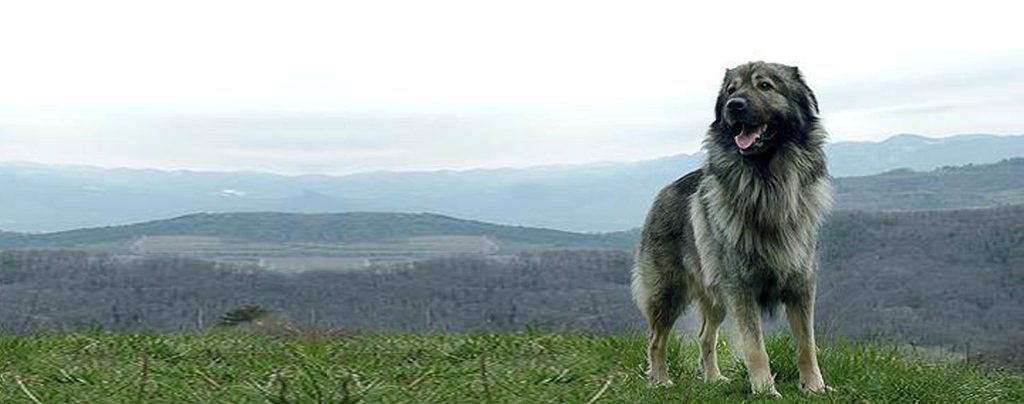
Known Health Conditions
Karst Shepherds are a breed of dog that originated in Slovenia. They are known for their intelligence, loyalty, and protective nature. However, like all breeds, they are prone to certain health conditions. One common issue that affects Karst Shepherds is hip dysplasia. This is a condition where the hip joint does not develop properly, leading to pain and discomfort for the dog. It can also cause arthritis later in life. To prevent hip dysplasia, it is important to ensure that Karst Shepherds are not over-exercised as puppies and that they maintain a healthy weight throughout their lives.
Another health condition that Karst Shepherds are prone to is bloat. This is a serious condition where the stomach fills with gas and twists, cutting off blood supply to the organs. It can be fatal if not treated quickly. To prevent bloat, it is important to feed Karst Shepherds smaller meals throughout the day rather than one large meal. It is also important to avoid exercise immediately after eating and to limit water intake during meals. If you suspect that your Karst Shepherd is suffering from bloat, it is important to seek veterinary attention immediately.
Openness to Strangers
Karst Shepherds, also known as Kraški Ov?ar in Slovenian, are a highly intelligent and loyal breed of working dogs. They are known for their exceptional ability to adapt to different environments and their openness to strangers. These dogs are highly social and enjoy being around people, making them great companions for families with children. They are also known for their protective nature, making them excellent guard dogs. Karst Shepherds are highly trainable and excel in obedience and agility competitions. They are also used as search and rescue dogs due to their exceptional sense of smell and tracking abilities.
Karst Shepherds are a medium to large-sized breed, with a muscular build and a thick coat that protects them from harsh weather conditions. They are highly active and require regular exercise to maintain their physical and mental health. These dogs are known for their friendly and outgoing nature, making them great companions for people of all ages. They are also highly adaptable and can thrive in different environments, from rural farms to urban apartments. Karst Shepherds are highly intelligent and require mental stimulation to prevent boredom and destructive behavior. They are loyal and devoted to their owners, making them a popular choice for families looking for a loyal and protective companion.
Playfulness Level
The Karst Shepherd is a highly energetic and playful dog breed that requires plenty of exercise and mental stimulation to stay happy and healthy. These dogs are known for their love of play and their ability to entertain themselves for hours on end. Whether it’s chasing after a ball, playing tug-of-war, or simply running around in circles, the Karst Shepherd is always up for a good time.
Despite their playful nature, however, these dogs are also highly intelligent and require plenty of mental stimulation to stay engaged. They are quick learners and respond well to positive reinforcement training methods, making them an excellent choice for owners who are willing to put in the time and effort to train them properly. With their high energy levels and love of play, the Karst Shepherd is a great choice for active families who are looking for a fun-loving and loyal companion.
Suitability as a Pet for Children
Karst Shepherds have a strong and protective nature, making them a great choice for families with children. They are highly intelligent and easily trained, which means they can be taught to behave well around kids. Their loyalty and affectionate nature also make them great companions for children. Additionally, their high energy levels mean they love to play and run around, which can be great for keeping kids active and engaged. However, their size and strength mean they may not be suitable for very young children or those who are not used to being around dogs.
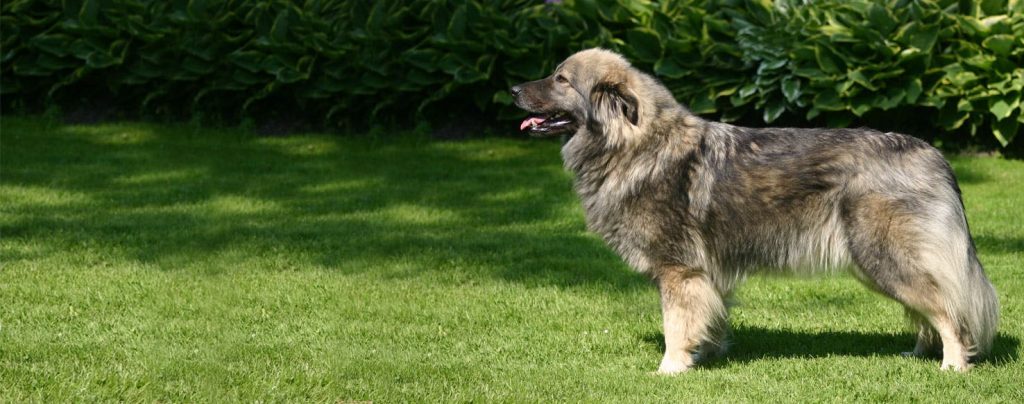
Exercise Needs
Karst Shepherds are highly active dogs that require a significant amount of exercise to maintain their physical and mental health. These dogs are known for their high energy levels and love for outdoor activities. They are best suited for owners who can provide them with ample opportunities to run, play, and explore. A daily exercise routine that includes long walks, runs, and hikes is essential for keeping these dogs happy and healthy. Karst Shepherds also enjoy playing games such as fetch, frisbee, and agility training, which can help them burn off excess energy and stimulate their minds. It is important to note that these dogs have a strong herding instinct and may try to herd other animals or people during playtime, so it is crucial to supervise them closely.
In addition to physical exercise, Karst Shepherds also require mental stimulation to prevent boredom and destructive behavior. These dogs are highly intelligent and thrive on learning new skills and tricks. Owners can provide mental stimulation by engaging in obedience training, puzzle games, and interactive toys. Karst Shepherds also enjoy spending time with their owners and may become anxious or destructive if left alone for long periods. Therefore, it is important to provide them with plenty of socialization and attention. Overall, Karst Shepherds are active and intelligent dogs that require a lot of exercise and mental stimulation to stay happy and healthy.
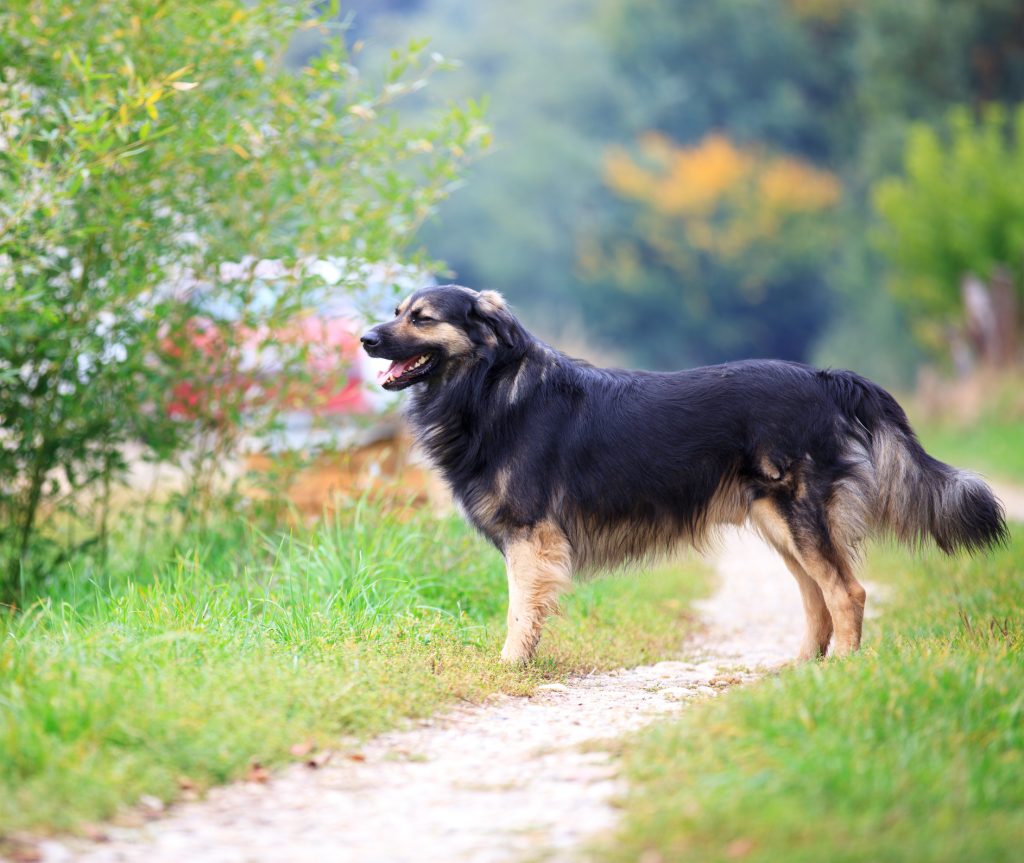
Suitability for a Multi-Pet Family
Karst Shepherds have a reputation for being protective of their family and territory. They are known to be wary of strangers and can be aggressive towards other dogs if they perceive them as a threat. However, with proper socialization and training, they can learn to coexist peacefully with other pets in the household. It is important to introduce them to other animals at a young age and supervise their interactions to ensure everyone’s safety.
Housing Requirements
Karst Shepherds are a highly active breed that require a lot of space to move around. They need a large, secure garden or yard to play and exercise in. A minimum of 500 square meters is recommended for this breed. The garden should be fenced with a minimum height of 1.5 meters to prevent them from escaping. Karst Shepherds are known for their strong herding instincts, so it is important to ensure that the fencing is secure and that there are no gaps or holes that they can escape through. Additionally, they require a comfortable and spacious indoor living area that is well-ventilated and temperature-controlled. The indoor area should be large enough for them to move around freely and have their own space to rest and sleep.
Karst Shepherds have a thick, double coat that requires regular grooming to keep it healthy and shiny. They need to be brushed at least once a week to remove any loose hair and prevent matting. They also require regular baths to keep their coat clean and free from dirt and debris. Karst Shepherds are prone to certain health issues, such as hip dysplasia and eye problems, so it is important to provide them with a balanced diet that meets their nutritional needs. They should be fed high-quality dog food that is appropriate for their age, size, and activity level. Additionally, they require regular exercise and mental stimulation to keep them happy and healthy. Daily walks and playtime are essential for this breed, as they have a lot of energy and need an outlet for it.
Summary
The Karst Shepherd has a reputation for being a loyal and protective companion, making them a popular choice for those seeking a guard dog. However, their high energy levels and need for regular exercise may make them unsuitable for those with a more sedentary lifestyle. Additionally, their strong protective instincts may require early socialization and training to prevent aggression towards strangers or other animals. Overall, the Karst Shepherd may be a suitable pet for experienced dog owners who are willing to provide the necessary training and exercise to meet their needs.
Karst Shepherd Dog FAQS
Yes, Karst Shepherds are intelligent and eager to please, making them relatively easy to train.
Yes, Karst Shepherds are known to be great with children and make excellent family pets.
Karst Shepherds are generally healthy dogs, but they can be prone to hip dysplasia and bloat.
No, Karst Shepherds are large dogs and require a lot of space to move around. They are better suited for homes with a yard.
Karst Shepherds can be territorial and may not get along with other pets, especially if they are not socialized properly.
Yes, Karst Shepherds are high-energy dogs and require at least 1-2 hours of exercise per day.
Yes, Karst Shepherds have a thick double coat and shed moderately throughout the year.
Karst Shepherds should be brushed at least once a week to keep their coat healthy and shiny. They only need to be bathed when they get dirty or smelly.
A Karst Shepherd can grow up to 60-70 cm in height.
The average weight of a Karst Shepherd is between 30-40 kg.
